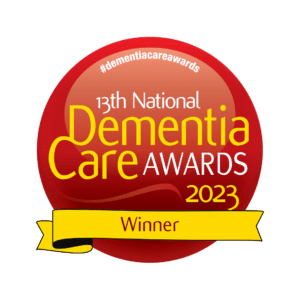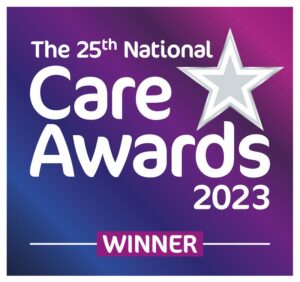At Hallmark Care Homes, we understand how stressful and emotional it can be for your loved one to move into a care home, away from the familiar surroundings they have been used to. Our relationship-centred approach to care recognises the uniqueness of every individual and we strive to create communities that enhance the quality of life for everyone in our care.
We tailor our care to the specific needs of each resident and treat individuals with dignity and respect at all times. We also recognise that those needs can change over time and we will adapt our care package for your loved one accordingly.
We’re often asked how we ensure each resident’s needs are met, even if their care requirements change over time, which is why we’ve put together this brief guide.
How residents’ needs are catered for
Once you and your loved one have viewed one of our care homes and are happy to go ahead and move in, a member of our senior care team will arrange a pre-admission assessment. Ideally, this will take place with key family members present and in your loved one’s own home where possible. Alternatively, it can take place in a care home or hospital.
The main purpose of this assessment is to answer any questions you may have about life in the home, as well as be an opportunity to meet a member of the care team who will be supporting your loved one. It’s also a chance for us to start to get to know your loved one and to assess their care and support requirements, so we can put a robust care plan in place to support them when they move in.
We will also undertake several risk assessments during this initial meeting to ascertain whether we need to put in place any measures to reduce the risk of your loved one falling, ensure their dietary requirements are met and understand whether they have any specific mobility needs.
This pre-admission assessment will be thorough and take as long as is necessary for our team to gain a complete understanding of what actions we need to take to fully support a smooth transition into their new home. As a guide, allow for two hours.
How the ‘About Me’ book is used
As part of getting to know your loved one, we ask all new residents to fill in an ‘About Me’ book with the help of their family. It’s important to us that residents can live a fulfilling and active life and continue to do as many of the things they’ve always enjoyed as possible. All of our homes have a dedicated lifestyles team that supports residents to maintain their existing hobbies and interests, discover new ones, and work towards long-held or new ambitions. But it’s also important that our care team understands each resident’s social and emotional needs too, so that they can provide encouragement and support.
The ‘About Me’ book is a vital tool and we ask that it is completed before joining us, so we know how best to welcome your relative to our home. They can tell us how they like to spend time, what their likes and dislikes are, their favourite foods, and what hobbies and interests they have. We use this information to tailor activities and events that will stimulate them, meet their expectations and ensure they enjoy their time in the home.
How your loved one’s care needs are taken into account.
When your loved one joins us, in consultation with you and them, our nursing and care teams will develop a clearly defined care plan or care pathway, that is acceptable to everyone and also takes into account how their needs might change over time. The plan will be informed by the risk assessments already undertaken and will be reviewed regularly and evaluated monthly to ensure that the planned care package is still the right one for your relative’s needs. You will always have an opportunity for input into these evaluations, but any changes we suggest will be timely, and necessary, and will include input from other care and medical professionals, including, where relevant, GPs, dieticians, district nurses and tissue viability specialists.
Unless there is a major change in a resident’s health, we will undertake a formal care plan review every six months to ensure your loved one’s care and support needs are still being met by their current plan. Along with the key professionals involved in your relative’s care, you will have the opportunity to be present, as will your loved one, if they are able.
Ensuring your loved one’s care needs are met
You may be wondering if the potential changing needs of your loved one will determine which room they will be given within our community. We use the information gathered at the pre-admission assessment to inform the initial care plan and direct and define support that will best suit them. While we will always try to ensure that residents get the room of their choice, our primary aim is to meet their care and support needs so, in certain circumstances, it may become necessary for them to move to another community within the home where team members have the necessary specialist skills to continue supporting them appropriately, for example, moving from a residential community to a nursing community to be supported by qualified nurses and other specialists.
You can be sure that your loved one’s needs will be continuously monitored via our care plan reviews and additional support will be provided as and when required.
Another common question is how your loved one’s freedom might be affected. We will always support residents to maintain their desired lifestyle – as defined within their care plan and underpinned by regular risk assessments. We will support them to access the local community, such as visiting the shops or meeting friends, either alone or with a family member. If your loved one has the capacity to understand the risks of going out alone, then we will always respect their decision to leave any time they choose.
If, however, we feel that their ability to make that decision is impaired and that they require constant supervision for their own safety, we will submit a Deprivation of Liberty Safeguards application to the Local Authority. A DoLS application means that we can legally monitor and restrict a resident’s freedom outside the care home if we feel their welfare will be compromised. It doesn’t mean they can’t leave the home, it simply means that they will need to be supported by someone.
What happens when care needs change?
We also know that it’s important for residents to receive any additional care they might need when required. That’s why we carry out regular reviews and will always try to anticipate when extra support may be needed.
If your loved one is already in one of our homes that provides nursing or dementia care, then a change in care requirements doesn’t pose a problem. For example, if they are in a residential care community and later require nursing care, this can be provided within the same home.
Some of our homes only provide residential care, so if your loved one later requires more specialist care, we will do our best to support them within our home, through working with local district nurses, GPs and McMillan nurses.
We always try to identify at the pre-admission stage what your loved one’s nursing requirements may be in the future and discuss with you how that will be managed. We will consult with you on an ongoing basis and, in the event of deterioration or an increased need for care, will inform you of what we think is the best way to improve your loved one’s quality of life.
We want your loved one’s stay with us to be a happy and fulfilling one. Our relationship-centred approach to care enables and supports our residents to carry on doing the things they’ve always loved for as long as possible. We are dedicated to providing the highest quality of care in safe, warm and friendly environments, with highly experienced, compassionate team members whose primary concern is the welfare of our residents.











